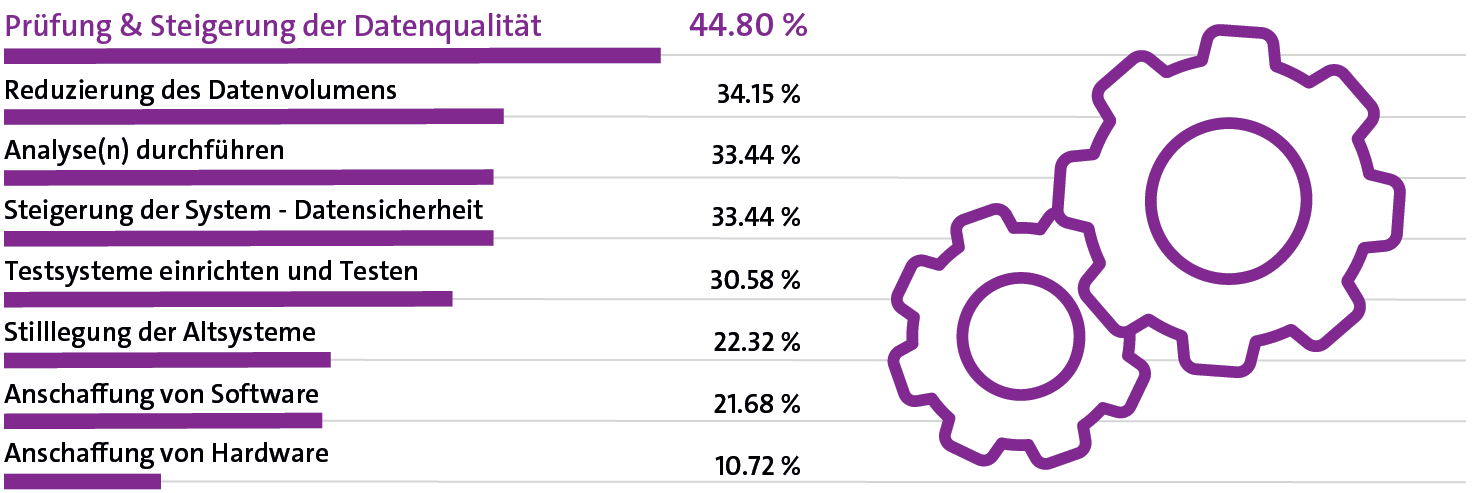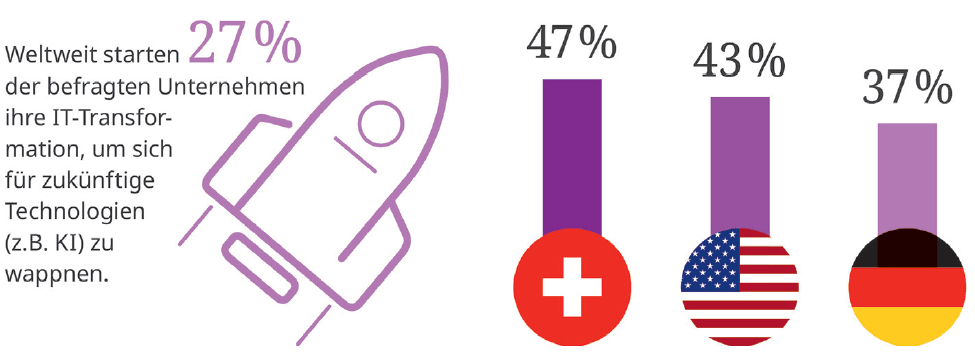Successful IT Transformation


This study was conducted across the entire IT scene. However, it also shows the particular challenges of S/4 conversion with greenfield, brownfield or selective data transformation. The challenges can be overcome if they are accompanied by experts. Experts like NTT Data Business Solutions and Natuvion.
The latest study by NTT Data Business Solutions and Natuvion revealed three main points: First, companies are launching their IT transformations to reposition themselves organizationally; second, one in three companies bemoan a lack of transformation know-how
thirdly, existing customers see early collaboration with external consultants as essential for their transformation success.
Transformation processes are used to reorganize the company's own structure and processes. Business process reengineering is not currently a buzzword in the IT and SAP scene, but efforts are moving in this direction and clearly demonstrate the old demand of former ETH Zurich professor Niklaus Wirth: the orchestration of algorithms and data structures. The international study by NTT Data Business Solutions and Natuvion shows the necessity of reorganizing business processes (algorithms) and data management, see graphic on this page. E3 Magazine has invited to a virtual round table discussion: The Recording is available on the E3 YouTube channel.
Right at the beginning of the interview (YouTube mark 4:50: What is Natuvion doing in the SAP community and the motivation behind the study with NTT Data), Patric Dahse from Natuvion says: "We wanted to know where the market is heading in order to see for ourselves and together with our partner NTT Data Business Solutions where the challenges lie and what has changed in the scene. Ultimately, it's about identifying trends at an early stage so that we can adapt our portfolio in good time. To this end, we conducted the study not only with our customers, but with the entire IT scene in order to gather holistic experience and then make it available to the market."
During the transformation process, companies particularly underestimate the communication between departments and divisions as well as the provision of sufficient resources. In the SAP community, S/4 conversions can usually be divided into three groups: greenfield, brownfield and selective data transformation. The fact that such projects are usually more complex and time-consuming than expected is demonstrated by the latest figures from the international Transformation Study 2024. The study provides descriptive insights into transformation practice and is therefore also an important guide for the SAP community. More than 1,200 CEOs, CIOs and IT decision-makers from a total of fifteen countries were surveyed on ongoing or completed transformation projects.

According to a Bitkom study, 60% of German companies currently see selected competitors who have focused on digitalization at an early stage as having an advantage. The need for a transformation process is therefore demonstrable and the need for optimization and change is growing. A year ago, the figure was 52%, five years ago it was just 37%. At the same time, 87% believe that the use of digital technologies plays a decisive role in the competitiveness of the German economy - but 76% say that German companies do not use them enough. These figures alone prove it: The digital divide is widening in German companies. While pioneers are increasingly increasing their lead, laggards are falling further and further behind.
The respondents in the study by NTT Data Business Solutions and Natuvion stated that new technologies such as artificial intelligence are the second most common transformation motive. However, Bitkom found that 70 percent of companies in Germany will not use AI in the next ten years. The demand: In 2024, IT must expand its applied technical skills for innovative technologies such as AI, big data and the cloud so that companies can improve their competitiveness. It can then also provide targeted advice to the business on how to achieve competitive advantages. At the same time, business employees must be trained as digital pioneers and IT must share responsibility for business success. Mixed teams from business and IT promote the necessary cultural change in the company in order to benefit from digitalization and AI.
In today's complex, constantly changing business world, individual applications are required that are specially adapted to each use case. Due to increasing cost and competitive pressure, the effort required for this can hardly be managed manually. However, before they can be used, companies must first consolidate their traditional heterogeneous IT and data architecture. They need a uniform, comprehensive infrastructure and data platform as a basis for the use of AI. Corresponding pilot projects must be initiated by 2024 at the latest.
Process expertise and data
In the E3 discussion, Florian Sackmann from NTT Data Business Solutions emphasizes the importance of first looking at the processes and consolidating the data before using AI (YouTube brand 13:36). It is clear that the basis for the future use of new technologies is the orchestration of existing business processes and data structures. "At Sapphire in Orlando, USA, and Barcelona, SAP naturally promoted the topic of AI very strongly. But it's also about the question of creating a basis for these AI possibilities with the S/4 transformation," says Florian Sackmann in the YouTube video (9:58).
The question was asked for the first time in the study: What role did the introduction and use of AI play in your transformation project? AI was a key driver of transformation for around a quarter of all companies. However, more than a third of all respondents rated the topic of data protection as a relevant driver for the transformation and therefore rated it significantly higher than the topic of AI. AI played no role in the transformation project for one in five of the companies surveyed. It is astonishing that data protection is thus rated even higher as a reason for the transformation than the many new, promising opportunities offered by artificial intelligence.
However, the introduction of AI requires much more preparation than the provision of new software versions. Weaknesses in the company must be identified and eliminated before AI is used. In order to achieve sufficient infrastructure readiness, architecture and services must be tidied up, cloud readiness established and an IT target operating model developed. This defines how IT works together with the business for use cases. The quality, maintenance and architecture of the data are then successively optimized as part of the data transformation. This is the only way for companies to know where the right data is located and how they can access it. This means that IT must be fit in terms of technology, processes and organization before the use of AI makes business sense. This in turn requires a clear commitment from management.
Hannes Frischmann is responsible for SAP at BizLink Industry (YouTube brand 16:18) and explains his challenges and the specific solution approach of existing SAP customer BizLink in the E3 interview. His department is an indispensable part of the digital transformation, as it forms the foundation for orchestrating the networked IT world as a competence center. However, given the rapid pace of technological development and exponential data growth, SAP departments need to be flexible, scalable and secure.

ㅤ
ㅤ
"Good data has always been the basis for innovative processes and in the age of AI this importance is increasing."
Patric Dahse,
Founder and Managing Director,
Natuvion
Disruptive techniques
The aim of the partnership between NTT Data Business Solutions and Natuvion is to offer companies and especially existing SAP customers comprehensive support in coping with new disruptive technologies, major regulatory changes and S/4 conversion. The most important finding from the study is the increasing importance of comprehensive management of processes and data, see YouTube video 20:46. In the face of these radical changes, existing SAP customers need expert support to prepare for the changes in the SAP community. NTT Data Business Solutions and Natuvion's experience and technical expertise in business analysis and project management cover both the upstream and downstream phases of digital transformation projects.
The existing business model has the momentum to efficiently orchestrate and manage all types of transformation processes. Given the complex challenges associated with integrating modern business processes (end-to-end) and data structures, it is essential for existing SAP customers to work with qualified providers. The holistic approach and broad functional coverage are key success factors in ensuring that the potential of an S/4 conversion is fully exploited, see also YouTube mark 23:27What is necessary for data management.

For existing SAP customers, the ERP system forms the basis for almost every digitalization strategy. This is a key finding from the latest study by NTT Data Business Solutions and Natuvion. However, the lack of transformation expertise appears to be a major obstacle on the path to new, innovative and efficient IT. Those responsible were surprised by their teams' lack of experience, see also YouTube brand 42:41Early communication is important for a successful transformation. It is therefore hardly surprising that the participants in the study, when asked which organizational measure was of decisive importance in the transformation process, put the development of new skills in first place by a wide margin.
It is only logical that more than a third of all respondents rated "Engage consultants early on" as the second most important organizational measure. This is a value that has moved further and further forward over the course of the past two transformation studies. Word has probably already spread internationally that consultants with transformation experience are even rarer than good IT specialists. In the SAP market, there are even analyses that claim that there is a six-figure shortage of consultants to complete the migration to S/4 Hana that SAP is aiming for by 2027.
While new topics such as the cloud or, most recently, AI are constantly being hyped, large parts of the SAP community are busy solving problems that are considered solved from SAP's point of view.
Many existing SAP customers complain about media disruptions between the IT system and actual business operations. If the ERP system is the key to success in digitization, then it should also be free of media discontinuities. Typically, a migration path results from the inventory and analysis of the systems and data. However, it is not uncommon for this to already be determined with SAP S/4 without having searched for the best path in the databases and systems.
One in five participants in the transformation study would choose a different migration strategy next time, see YouTube marker 16:18 and 19:40 in the statement from existing SAP customer BizLink. This applies more frequently to those who chose the greenfield approach. Brownfield migrants are much less likely to do so and those who have opted for a selective data transformation are the least likely to change their transformation path, as Hannes Frischmann from BizLink Industry confirms.
It is also interesting to note that greenfield users tend to use older systems on average. Brownfield users, on the other hand, are often characterized by the most modern systems in-house. However, it is only logical that when you have just completed a migration with all its costs and challenges, you choose the quickest and easiest route. Those who migrate using the brownfield approach invest less money and are slightly less likely to exceed budget and time constraints than their greenfield counterparts. They also have a much smaller migration window or can afford no or only minimal disruption to business operations. It should also be emphasized that the go-live is most frequently postponed in greenfield projects. Brownfield users are in second place on this inglorious list. The fewest postponements occur with selective data transformations.

ㅤ
ㅤ
"It is also about the question of creating a basis for AI possibilities with the S/4 transformation."
Florian Sackmann,
Management Customer Engagement,
NTT Data Business Solutions
Organization of communication
A key finding of the Transformation Study 2024 is that companies often underestimate the challenges of their IT transformation - above all the organization of communication between departments and divisions during the process. The lack of existing transformation knowledge in companies is also particularly striking. In direct comparison to the previous year, the number of those who identified a lack of transformation expertise in their own company actually increased by five percent. "The study clearly shows that a lack of expertise and a shortage of skilled workers are the main factors slowing down the transformation of companies. However, innovative and efficient IT is crucial in order to remain competitive," explains Norbert Rotter, CEO of NTT Data Business Solutions. "The strategic management of transformation projects is therefore becoming increasingly relevant for companies worldwide. We involve managers and employees in the change process at an early stage and use our 35 years of expertise to ensure that our customers achieve their transformation goals on time and within budget."

More than half of companies state that they are using more cloud services as part of the transformation. It is known from other studies that this figure is not quite as high in the SAP community. But in all IT areas surveyed, greater flexibility and faster customization options are the main reasons for cloud use. Other reasons for the increased use of the cloud include the acceleration of business processes and, once again, faster and easier access to technical innovations such as automation. Better scalability and greater data security are also of key importance for cloud use.
Patric Dahse, Managing Director of Natuvion, which has been part of NTT Data Business Solutions since August 2022, emphasizes the central importance of data quality for transformation projects: "Good data has always been the basis and fuel for innovative processes and in the age of AI, its importance continues to increase. The study results confirm this and show that Only those who keep their data harmonized and centrally available in the appropriate quality will be able to make optimal use of the blessings of technical developments in the future." Because one thing will be clear by 2024 at the latest: digitalization and AI are a matter for the boss - and not just an IT project.
To the partner entries:








